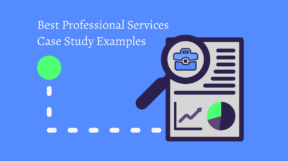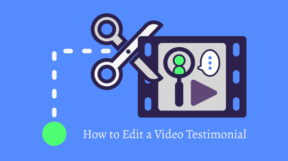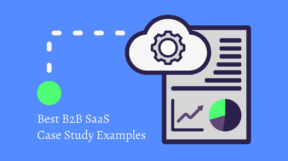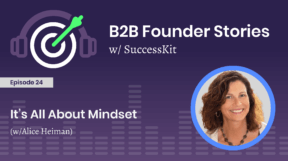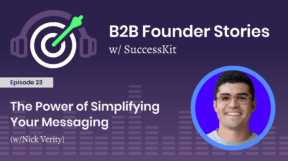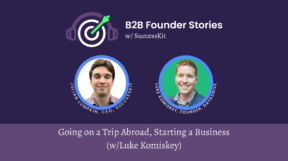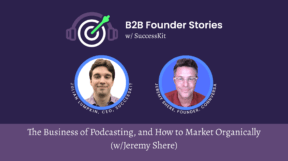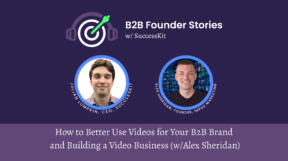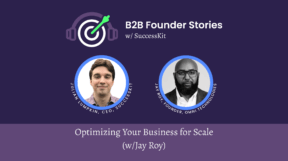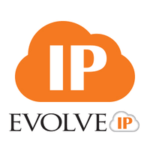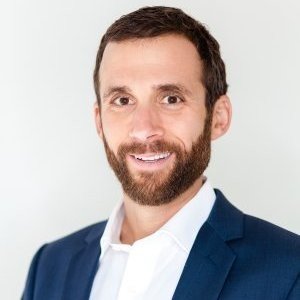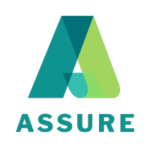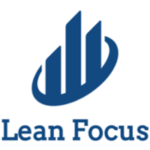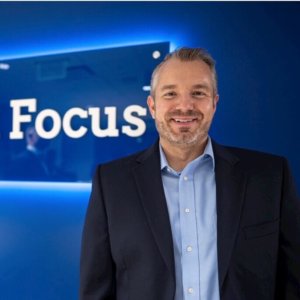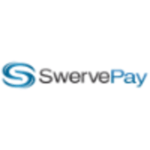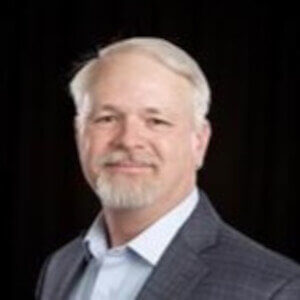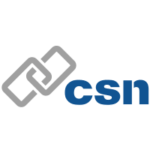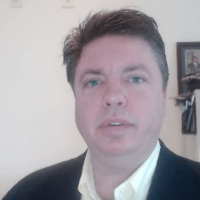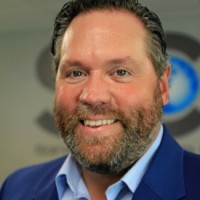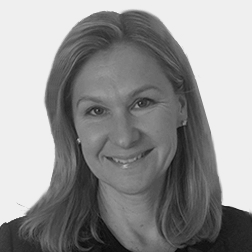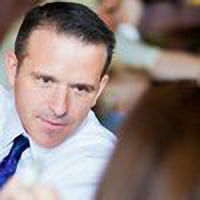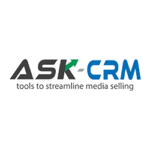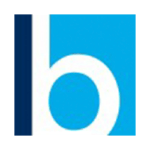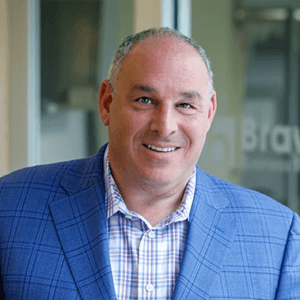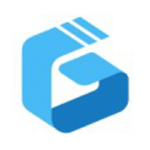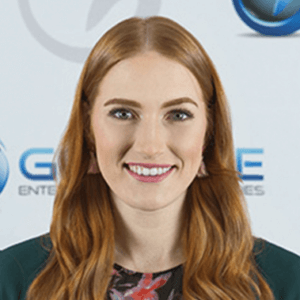Listen to this episode now on Spotify or Apple!
The fifth episode of our B2B Founder Stories podcast features Kendall Kunz, the founder and CEO of Forms On Fire. Kendall describes why he started the company, how and why it has grown since the beginning, and why he believes it’ll be the last company he starts. He also embodies an important attitude in terms of experiencing failures as a founder and identifies his past missteps, which ultimately led to the success of Forms On Fire.
“I think that as an entrepreneur, you have to look at the downside at some point and you have to say, ‘What am I willing to lose for this?'”
Kendall Kunz, Forms On Fire
Transcript of Podcast Episode 5: Taking Failures In Stride (w/Kendall Kunz, Founder of Forms On Fire)
Julian Lumpkin: Welcome to B2B Founder Stories with SuccessKit. In this episode, I interview Kendall Kunz. He is the founder and CEO of Forms On Fire. Forms On Fire is a client of ours, so I’ve seen firsthand the way his clients speak about working with him, his team, and their product. So I’m super excited to share with you this interview, where we talk about how Kendall started his company, grew it, and maintained the culture of customer success that shows through in his work and his clients. I hope you enjoy this interview. All right, Kendall. Thank you so much for joining us on the podcast.
Kendall Kunz: I’m glad to be here, Julian. Thanks for inviting me.
Julian Lumpkin: All right. So to begin, since you are the founder and CEO of Forms On Fire, can you tell us a little bit, give our audience a super quick explanation of who and what Forms On Fire is?
Kendall Kunz: I’ll be delighted to. So Forms On Fire is a mobile cloud platform where we offer clients the ability to completely eliminate paper and go paperless for all of their field staff. The typical kind of company that uses it will use it for inspections, for checklists, for orders, anything that they’re doing in the field, and then it actually helps to connect their field team with their office team, and they can stop wasting time and money on paper forms and actually get real information back to the company.
Julian Lumpkin: Awesome. Well, having done a bunch of case studies for you, we’ve seen firsthand just how well it works and heard quite a bit of your clients raving about you. So we can certainly verify that. Now, our podcast is a lot about telling people what it’s like to be an entrepreneur. So can you give us kind of the quick description of your company in terms of how long ago you started it and the size of your company now in terms of employee count?
Kendall Kunz: Yeah. At absolutely. So we generally don’t talk too much about numbers in terms of revenue numbers and those things, but with employees and contractors combined that are supporting everything that we do in the company, we’re about 35 total and the company was founded in 2012. Actually, I had started another company in 2009 called Bellevue Technology Partners, and there’s a pretty interesting story about how we transitioned to it, but suffice to say what we did is we launched this ability in 2012 around mobile cloud applications in this platform and just grown ever since then. So it’s been quite a journey.
Julian Lumpkin: Nice. And I want to talk a little bit about starting the company, but real quick, what was your personal background before that? Were you on the technical side? Were you interested in no code apps? Were you more on the sales or business side? How did you find yourself in this company, running this company?
Kendall Kunz: Yeah. Great question. I have actually a technical background and a business background. So I went to business school at Purdue. I started my career at Oracle many years ago. I’ve always been in involved in primarily software companies, even a stint of having a couple of gained companies that I started. And this is the fifth company that I’ve had. And so when I got into it, when I got into Bellevue Technology Partners, that was primarily a consulting company and I loved what it was doing, but I wasn’t involved in any of the projects from a technical aspect. And that just became frankly quite boring. And so I really tried to think back, when was I most excited about the things that I was doing? And I remembered my time at Oracle where I combined this technical capability along with my business and sales skills, and I was seen by both clients as well as my coworkers as an expert in my field and very trusted.
Kendall Kunz: And so I was trying to get back to something like that where I could combine that technology, understanding that I have and have my hands in the technology as well as to apply my business skills. And out of it, I had to do something different from Bellevue Technology Partners, because that became mostly just a staffing company. So when we started doing research, we got into and looking at things in social mobile and cloud computing, we landed on this capability where iPads were just kind of coming out. I was like, huh, iPads really make it possible for us to see how people can get rid of their paper forms. And so we launched into this and you never know if companies are going to be successful in the beginning, most of them are not. And through a lot of hard work and customer feedback, we’re so grateful for our customers, they just love what we’ve produced and so we just keep producing more of it. Yeah.
Julian Lumpkin: Nice. Yeah. It sounds like, I’m not an expert in your industry, but you were pretty early into something that’s growing quite a bit. First in leveraging the iPads and now, would you call Forms On Fire a no-code application?
Kendall Kunz: We’re a no-code, considered a no-code platform where you don’t have to be a programmer to learn how to use it. I tell people you need to be clever with computers and if you’re good in Excel, you’re going to be terrific on our platform. Yeah.
Julian Lumpkin: Nice. So whenever I talk to entrepreneurs, I kind of notice that there’s sort of two types of entrepreneurs, and I’ll tell you which one I am too. But the first type of entrepreneur, which is what we hear about in the news more, they always tell me, I could never imagine doing anything else. I have to be an entrepreneur. I have to work for myself. The second kind could work at a regular job, but maybe happens to be an entrepreneur. I’m actually the second kind. I was not planning on being an entrepreneur, I sort of fell into it. I’m curious, because you’ve been working on your own for a while, in your own companies, do you feel like you were destined and had to be an entrepreneur or could you have just as well been working as a senior vice president somewhere?
Kendall Kunz: That’s a great question. When I first started my career at Oracle, I thought, somebody is going to have to take over for Larry Ellison. He’s older than I am. I’m going to be around much longer. I could certainly fall into those shoes, and I always thought that I would take this executive path. And then when I was recruited by a friend of mine, four years after joining Oracle for a little startup in Seattle, and having worked in that industry and worked as an executive in a company, but getting ownership in the company. And since then I’ve actually had a couple of stints where I was an employee. I was the interim CEO at PopCap Games. I was the CEO of Explorer Consulting. And I will just tell you that probably I’m not cut out to be an employee. I think I’m pretty much cut out to do my own thing.
Kendall Kunz: I love Forms On Fire and this probably will be my last company that I start. And it’s not necessarily that I even believe that this is the greatest idea in the world. There’s a lot of great ideas and I think I would be very comfortable in executing on a lot of great ideas. In fact, I see myself pulling myself back often of not wanting to go in and do some other ideas simply because I need to remain focused on Forms On Fire. But I do think that I would only be the kind of entrepreneur where I would be happy just working for myself and starting something on my own. Even if it didn’t turn out to be something gigantic or even that successful. But I love the challenge. Yeah.
Julian Lumpkin: Nice. We kind of talked about when you started the company, I think you said 10 or 11 years ago. As we all know, most companies fail even with a good founder and a good idea. Why do you think Forms On Fire was able to become successful, if you had to choose one thing that was a little bit different about what you did?
Kendall Kunz: Well, that’s a great question. And you know, I had a failure in the past. I had two game companies and one was successful, very successful. We released about six game titles that were very successful and that company was bought out by another company. And then I started a game company and I think it was 2006 or 2007 called Kick Play, and that was a failure and it failed because we were building something we thought would be fun and it wasn’t fun. I really understood the problem that people had and we went forward with trying to create something that would give clients the ability to capture information offline. And we made a couple of strategic decisions in the beginning that allowed us to get early success.
Kendall Kunz: But the first several customers are very difficult, and looking back on it, there’s a lot of luck involved. I mean, game companies, 99% of them fail. Software companies it’s probably not that high of failure, but it’s still in the 80 plus percentile that fail. And so I think we did the right thing. We built as much of the product as we needed to to get it out to market and we just built it on the right platform and it ended up being a success. But when you launch it, you don’t know, is anybody is going to like this? And especially with having failures, is anyone really going to like this? You start advertising and then people come in and you find out, wow, they really do like it.
Julian Lumpkin: Well, the most interesting part to me, what you said and what I take note and I like to point out to my audience of any aspiring entrepreneurs, is just the way that you just spoke about the failure. We’re doing audio only here, but I can see you and there is a big smile on your face. And I feel the same way myself and in my career, that one of the things that I think enabled me to ultimately start a little successful company was really, truly not being afraid of failure. And not saying it in the way like, oh, I can handle it. I can get over it, but just to start to, it sounds like a cliche, but to really look at failure as a learning opportunity. And without putting words in your mouth, from kind of the way you talk about it, I can see that you have, let’s say a healthy relationship with the possibility of failure.
Kendall Kunz: Yeah. I would say that’s true. And I would say it’s even more true after having this failure with Kick Play. And I looked back on that time, even as I was starting Forms On Fire. So I was running Bellevue Technology Partners that was being successful and that was kind of the next company after Kick Play the failure. But I always kept looking back at Kick Play and saying, how could I have failed sooner? And we didn’t lose a lot of money, but I think I could have gotten out of that with a failure with about a 10th of the loss and it was all funded with my own capital. I think I could have lost only a 10th of the amount of money and discovered that it was a failure.
Kendall Kunz: And I’ll tell you what the real key point was. There’s a guy named Eric Ries. He wrote a book called, oh gosh, his book name is escaping me, but he’s the guy that really invented this concept of the minimum viable product. It’s called The Lean Startup, the book. And I went and watched him when he was launching that book. I watched him speak, Eric Ries speak, on this concept of the lean startup. And as I started to look at how everything should be measured from the standpoint of test everything, yeah, we think the game is going to be fun, but is it really? How do you know that? How can you test it with a minimum viable product? How can you test your concept? How can you test the concept?
Kendall Kunz: What we did is we created these experiments in social mobile and cloud computing. And actually through Bellevue Technology Partners, we went out, we sort of built some relationships with some companies and we had a couple of those fail and then when we built a relationship with a company that was built on top of the SharePoint and InfoPath platform, but that was going mobile, we found success with that. And so as we were kind of peering our way into the marketplace, figuring out how to fail sooner was way more fun. And yeah, I wasn’t afraid at all because we’d had these other failures. And obviously it sounds like you got to a point when you started your company, you weren’t afraid to fail. So you may as we’ll give it a shot.
Kendall Kunz: I think that as an entrepreneur, you have to look at the downside at some point and you have to say, what am I willing to lose for this? What’s the maximum amount I’m willing to lose for this and really take the chance and then go for it and really feel comfortable and just give it your all to that point. Where, okay, is it a go or no go when you hit that point of what am I willing to lose? In other words, have I had enough success or has it been a totally blatant failure? And yeah, let’s just go ahead and shove that under the carpet and move to something different. Yeah.
Julian Lumpkin: Well, there’s so much you said that’s interesting and I can personally relate to. I remember finding the book, The Lean Startup as I was leaving my job and getting ready to start SuccessKit, and read the entire book in 24 hours because it was resonating so well with me. How well I applied the lessons over the next year or two is open to debate, but the book certainly helped me and also gave me a way to think about minor failures, experimenting and kind of getting into the right mindset.
Julian Lumpkin: So changing directions, I always like to give my audience a glimpse into the life of a successful entrepreneur. Like what it really looks like. So many people think about starting their own company and think about what it would be like to own a medium-size company that’s doing well, but I don’t think most people really know what it’s like. I think you hear all different stories of Elon Musk type sleeping under their desks to people traveling the world and checking email once a week. But I like to give the kind of real-world answer to what it looks like. So walk us through a day in the work life for you, Kendall. What are you doing with your time? What does a workday look like for you?
Kendall Kunz: It seems like almost all of my workdays are different, one from the next. I mean, there’re certain things that we do. We have a weekly operations meeting where we literally go through every component of the business and we see, where do we stand in sales, in marketing, on the professional services side, on the support side? What are the issues? What are the top five issues that people have and the top five opportunities that each of the people on the management team have? We do that every Tuesday like clockwork, and it feels a little bit like getting out on a football field, blowing the whistle and running some offensive drills. Blowing two whistles and doing some defensive drills. And really, we just kind of have that part of it down like clockwork, which is great. And each of the groups, they have their own team meeting separately throughout the week where they’re getting from their teams what’s going on.
Kendall Kunz: And so we have a pretty good handle on the business from day to day and from week to week. They say if you meet weekly, you can only have as much as one bad week. If you meet daily, you can only have as much as one bad day. So the more frequently that you get together, you find out issues sooner, that’s good. My week is crazy. I work absolutely way too many hours. And I kind of look at that as one of my strengths, one of my competitive advantages. If I think about the other companies in our industry, they’re more funded, they have more employees, they have a deeper bench for doing development, they have a deeper bench on sales, we just don’t have that, but we make it up in some strength. We make it up in, if you look at some of how our clients talk about us and how we utilize the information that our clients say about us, we get a lot of leverage from that in our marketing.
Kendall Kunz: But if you even see me on a Saturday, when our support team is off, we have enterprise clients that are still working on Saturdays and Sundays. I’ll often take a call. Yesterday, I was driving out in the mountains and a support call, it drops to me. I’m on the very bottom of the list. I’m the last person it dials. I picked it up, the person needed some help. I helped them in about five minutes and they were on their way. But I will literally take calls from clients on the weekends. During the week when people are busy, I’ll try to fill in where if the support staff has not enough people for a day, I’ll fill in there. If the sales staff doesn’t have enough people, I’ll put myself on the call list. I mean, I literally will help out and do things.
Kendall Kunz: That being said, I also spend time looking at all the things that I’m doing and constantly asking myself, do I need to be doing that? I think I’m the best salesman in the company. I think I’m the best support person. Entrepreneurs think that they’re best at everything. It’s generally probably not true. But I really don’t mind that other people who maybe have less skill can do it as long as it gets off my plate. And if they’re learning great. If they make some mistakes, that’s what happens. Mistakes happen. It doesn’t matter. You give them a chance though to execute with excellence. If you don’t give them things to do, they’re never going to have that chance to fail and then to execute with excellence.
Kendall Kunz: I was just looking at my calendar, I’m trying to see, like I have three contractor meetings today. I’m trying to work with some people on the marketing side that are contractors. Two actually different contractors that we’re doing. I’m adjoining a product tour with a very large enterprise account that one of my account executives pulled me into. And then I have some internal meetings that I’m doing today. I have a call with somebody in Australia. I mean, the week is crazy, actually this week. Meetings everywhere. But generally I like to keep as much free time as possible in case people need help.
Julian Lumpkin: Got it. So it sounds like you’ve really taken on a role where you have people and teams in place to handle all the individual functions. You’re not consistently always directly getting involved, you’re supporting them and kind of ready step in to help. Did I summarize that properly?
Kendall Kunz: That’s really good. Yeah. And there are times where like in accounting they’ll have some issue and they ask me and part of me says, well, couldn’t you just do that yourself and get your job done? And I’m like, okay, I’ll show them, they need to be shown this time how to do it and I’m happy to do that. So I try not to judge. Once in a while the first thinking in my head is, you can figure it out, go ahead and do it. Most of the time they do, but if they’re asking me for help, they really are stuck and so I try to help them. Yeah.
Julian Lumpkin: Aside from of course being the CEO, are there any roles, whether it’s the biggest sales cycles, are there any roles that you’ve really taken on or held onto I should say that you’re still primarily responsible for at the company?
Kendall Kunz: I would say on the marketing side, I probably have way too much responsibility that I’m still involved with in terms of directing what the messaging looks like, directing what campaigns we’re going to do. I probably need to do less of that. As you know, Julian, I was pretty involved in doing or at least coordinating the case studies, and I have relationships with the clients where we were doing the case studies so that was easy. Generally with each of those clients I’m not involved operationally, but for those kinds of things and needing to get involved, I do. And I like to do less in marketing where I’m bringing in some more contractors to do that, but I don’t have that singular leadership role in marketing yet. We either haven’t found the right person or it’s working the way that it is, but I’m spending too much time there and that’s something that I’d like to change in the next year. Yeah.
Julian Lumpkin: Nice. So it sounds like in the beginning you held onto a lot more roles, which one was the hardest for you to sort of let go of and let someone else take control of?
Kendall Kunz: I think probably the sales role, just because I have a successful sales background. And so I think that was a little difficult, but we created some great tools that helped our sales people really come up to speed in terms of our pitch decks, in terms of precisely how the process works from one thing to the next. And that eased it a little bit better, but yeah, that was probably the one thing that was a little more difficult for me to let go of.
Julian Lumpkin: Yeah. I can relate to that. There’re a lot of functions that I was and am happy to let go of, but I do still struggle to see how I’m ever not going to be SuccessKit’s primary salesperson. But we’ll see how that goes in the future.
Kendall Kunz: You do great at it, and you know what? You’ll do fine when you find the right person, you really will. And I would encourage you to take the step out. If you can afford one, bring somebody in, even a junior one and teach them. Make some calls out and coordinate and then have them follow you around for six months and watch how you do it. That’s really the way that you can mentor someone right and then they’ll mimic you after that. You’ll be amazed.
Julian Lumpkin: That’s exactly what we’re doing. So I’ll use this as our initial announcement that we are hiring our first full-time junior salesperson at the end of Q1, going into Q2. And that’s exactly what it’s going to be, kind of a sales development rep who I’ll get to train and can take a lot off my plate, but I still, at least for the near term, can remain the primary salesperson here.
Kendall Kunz: Sounds great. Congratulations. It’s awesome.
Julian Lumpkin: Thanks. Thanks. Going back to when you started Forms On Fire and were growing it, what phase of the company’s growth was either the most challenging or took much longer than you expected it to take?
Kendall Kunz: So first of all, we started this in 2012 and in 2015 we pivoted our platform and changed the base technology and made the decision to go back to zero and start over again. That was a very, very difficult decision. A pivot that we needed to make though because the platform that we were kind of betting the company on was not going to be something that was going to scale enormously. So we pivoted in 2015. I would say that was the most difficult thing. And I would say that probably the most challenging part of that restart and even the very beginning is getting that first client, and then getting that second client and maybe you could call it the first 10 clients. And discovering, is this really something that people love or is this something that they’re just saying they love because they haven’t seen anything else? And I think getting that first customer, those first 10 customers was probably the most challenging.
Kendall Kunz: I would say today, now the most challenging thing is how do we compete in an environment where competitors have 10 times the marketing budget that we have? How do we get more people to see what we’re doing? How do we take market share when we’re out-funded on the marketing side? That’s becoming more challenging. We’re finding very interesting ways to get around that and to compete and do well, but those are the things that kind of keep me up at night in terms of scaling and looking at what the next challenge really is. Yeah.
Julian Lumpkin: Interesting. And without needing to get into too much specifics, but at a high level, what are those things? How can a smaller company with more limited funding compete when there’s money being thrown everywhere and you’re up against a bigger marketing budget? What are the things that you’ve made sure that you guys do differently?
Kendall Kunz: I think you have to tout your strengths. First of all, I really believe, and our clients I think say this better than I can say it. Our clients really believe that we have a better mousetrap. Better, faster, cheaper. We’re better, we’re less expensive, we’re faster. There are many things about our platform that are better. Looking at the specific strengths and focusing on those is really important. And when you think about, on marketing, what are the differentiators? The best differentiator that you can have is we’re the only ones who do this. The second best is we have the most of this. The third best is we were the first ones to do this. And then the fourth one is, we have the best quality of this or something like that. They fall off pretty quickly.
Kendall Kunz: But if you have several things, if you have two or three things that you’re the only one who does that and the way that you do it, and you can really focus on that message and hopefully that’s something that really clients want, then yeah, you can beat them. You just need an opportunity for the clients to call you. Marketing budget-wise, yeah, there’s probably a lot of leads that we’re not getting. However, we’re getting a lot of leads where clients have tried our competitor’s products and they come over to us.
Kendall Kunz: One of the ways that we do that is we competitively advertise for keywords of their name. Right? And so they fall and they say, oh, interesting. Yeah, Microsoft, for example, has a competitive product to ours. We do incredibly well against them. All we need is for people to be Googling the name of their product and they land on our website on a landing page. Just give us a chance and they’ll see how it’s really twice as good, five times as good and a lot less money. So you have to keep your finger on the pulse though, right? Because this stuff changes all the time with technology. But we feel so grateful of the reputation that we have with our clients. And I think it starts with that reputation. If you have an incredible reputation, it’s very difficult for a competitor to take that away from you. No matter how much funding they have, they can’t take away what your clients say about you. It’s something that you own in addition to the product and the technology that you have. Yeah.
Julian Lumpkin: Well, yeah, given what we do at SuccessKit, I couldn’t agree more with you about the client’s words saying you’re the best, of course. I want to transition to what’ll be the final part of this interview as we’re coming up on the time here. And since you’ve been an entrepreneur for a long time, I’m very curious to hear your perspective on how the entrepreneurial landscape has changed. So to give you a simple or a direct question as a jumping-off point, do you think it’s harder to start a company now than it was, let’s say, 10 or 15 years ago? And if so, how and why has it changed?
Kendall Kunz: I think in some sense it’s harder and in another sense, it’s easier. I think it’s harder because if you select certain markets and you do have competitors that out fund you, like if you go into technology from scratch and you don’t have some means of being first to market in a brand new kind of category, then you’re slogging it out with people that way out fund you. But I am really encouraged when I look across the landscape about how much better entrepreneurs can take traditional businesses and apply today’s technology, particularly internet marketing capabilities, and outflank competitors who have been in business for a very long time.
Kendall Kunz: Let me give you a couple of examples. I have some friends across the country that have their own business. And one of my friends has a cleaning company, a very successful cleaning company. And he doesn’t do any of the cleaning himself, he has it all contracted, and does phenomenally well because he’s an amazing internet marketer and seller and brand reputation. He leverages that brand reputation. I have another friend who has a company that does roofing. I mean, roofing has been around forever and he’s new to the business in the last 10 years. And yet now he’s almost in all 50 states. He has a very gigantic business, and how did he do that? Because he was able to leverage internet technologies, marketing, and build these different stuffs. And he did it all bootstrapped. It wasn’t funded. It was something they put together.
Kendall Kunz: So I think what I’m seeing is this kind of new breed of entrepreneur, where you can grab a hold of the traditional business, landscaping business or anything, and apply real good marketing skills with it and real good recruiting skills with it and then use your internet marketing capability, and you can go into markets that traditionally would be more difficult to get into. And I’m excited about that. For young people today, I think there’s amazing opportunity. There’s all these blue-collar skills that it feels like they’re going away. Nobody wants to do those jobs, right? Nobody wants to be a plumber. Personally, I think there’s a huge business in that because so few people want to do that. You can recruit and train your own people. You can build on these smart marketing skills. There’s lots of opportunity today.
Julian Lumpkin: Yeah. That’s really interesting. Actually, I have a couple clients that do digital marketing for more traditional blue-collar companies. And the results, like for my B2B clients, a good marketing agency will come in and increase leads 10% and they’ll come in and increase leads 400% in a couple of months sometimes because there’s so much opportunity there. Well, that’s a good transition to my final question which is, in your opinion, Kendall, what are the characteristics that make a good entrepreneur?
Kendall Kunz: Oh gosh. I think that, first of all, you have to believe in yourself. You really have to believe that you can do something. But I think along with that, a little humility is good. And we see all these huge entrepreneurs like Elon Musk and humility may not be part of their persona, and that’s fine at that level. But I see people who express gratefulness in what they’ve been given in terms of talents and capabilities, and I think if you can remain grateful and you can remain grateful for those people that you bring in, but you have to believe in yourself, number one.
Kendall Kunz: Two, I do think that as an entrepreneur you need to either be solving a problem that you’re already having. A lot of the best entrepreneurs, a lot of the best ideas that I’ve seen are where people, they keep having the same problem over and over and over again, and then they say, why don’t I solve that problem? I think your business might have been a little bit like that, Julian. I know in my previous companies where we’ve tried to write case studies, it’s been very difficult. We can start them, but we don’t finish them. We don’t get the right approvals from the clients. People lose interest. And are we really writing it with, does it really have the right tone and you can obsess about it? If you outsource it, you have people who are doing it all the time. They’re really writing it from, hey, there’re people who are going to be reading its perspective and I think you’ve got a great niche there, and you probably ran into that problem over and over.
Kendall Kunz: I think if you have a problem that you see and you believe in yourself and you can build something around it, I think you can do great things. And I also think, look, you don’t have to have all the money in the world to do it, but give yourself some runway. If you’ve got a job and you’re going to quit your job, give yourself six months to a year of runway, meaning savings that you can pay your bills. Or you can do it and wholly put your heart into it. I see a lot of people starting businesses and ask other people that are running businesses, how would you go about it? If you were doing this kind of a business, how would you go about starting it? What do you think are some good ideas?
Kendall Kunz: I learned something from every entrepreneur that I talked to. I remember when I met you, Julian, I was asking you a lot of questions about how you were doing advertising on LinkedIn and why was this successful and how come you chose that? Anyway, you can learn from everybody. So if you’re a curious person, you believe in yourself, you got a good idea, I think that’s a great start. Give yourself some runway and go for it.
Julian Lumpkin: That’s awesome. This conversation was great. It’s been so helpful. We too at SuccessKit have learned from you and listened to how your clients talk about working with you and have had the thought that that’s how we want our clients to talk about us. So we certainly appreciate the example you’ve set there and this conversation has been hopefully interesting for our audience. I know it’s interesting for me personally, so hopefully, other people will find it so as well. Anything you want to add before we wrap up, Kendall?
Kendall Kunz: Just keep doing what you’re doing, Julian, and for those who are listening, if you want freedom, entrepreneurship gives you freedom. To me, even more than money, the freedom that you have with your time, with your ideas, with who you want to work with, both from a vendor perspective, as well as an employee perspective and a customer perspective. I mean, if you want freedom, which I think honestly that’s American exceptionalism. American exceptionalism is the way that we can be free. Entrepreneurship is the tip of the spear for that. There are a lot of other ways that we’re more free in this country, but entrepreneurship is the very tip of the spear for how we’re exceptional. So I would encourage you, if you really have that, you’re never going to get younger. Give it a try. I’m on my fifth one and I love it.
Julian Lumpkin: Well said. I couldn’t agree more. Thanks again, Kendall.
Kendall Kunz: My pleasure.
Julian Lumpkin: Thanks for listening. I hope you enjoyed the interview. Stay tuned for our next episode coming soon. And as always, if you need help with your case studies, visit us at successkit.io.
Conclusion
Subscribe to the B2B Founder Stories podcast on Spotify and Apple and never miss an episode!
If you have an idea for a future topic you’d like addressed or if you’d like to be a guest on the series, contact Julian via the form on our Learn More page.
![Featured image for the blog post titled Taking Failures In Stride (w/Kendall Kunz) [PODCAST]](https://successkit.io/wp-content/uploads/2022/03/successkit-podcast-episode-5-kendall-kunz.png)



